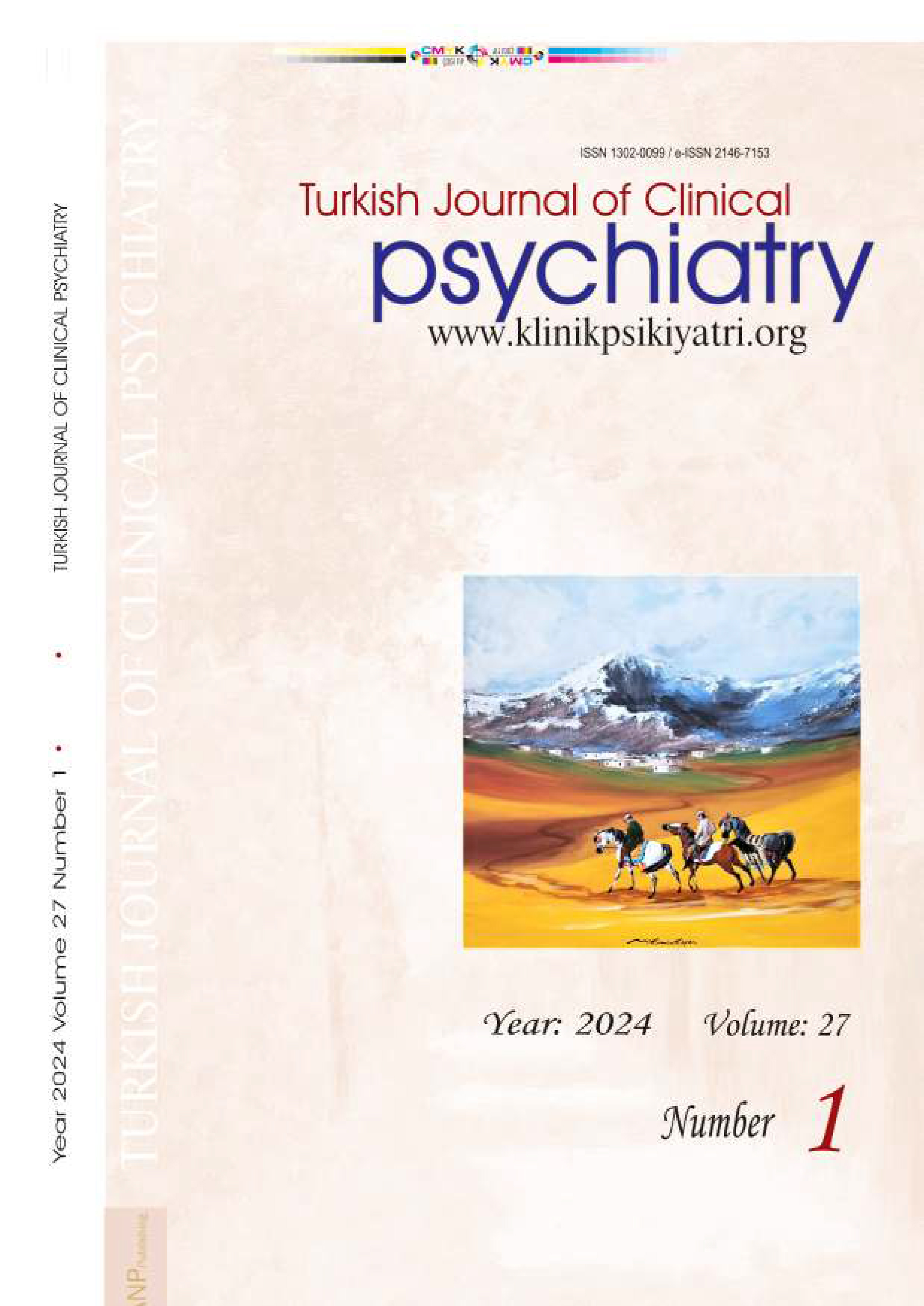





Evaluation of clinical variables, treatment resistance and factors affecting the hospital stay duration in geriatric depressive disorders (tur)
Selçuk ÖzdinOndokuz Mayıs University, Medicine Faculty, Psychiatry Department, SamsunINTRODUCTION: In this study, the clinical and sociodemographic characteristics and the factors affecting the duration of hospitalization in geriatric depression patients treated in a university hospital were evaluated.
METHODS: Geriatric depression patients who were hospitalized between 2009-2019 were evaluated retrospectively. 76 geriatric depression patients were included in the study. Comparisons were made according to whether patients were resistant to treatment and the age of onset of the disease. Factors affecting the duration of hospitalization were evaluated.
RESULTS: 44 of 76 patients who participated in the study were male. Most of the patients (42/76) were admitted to the psychiatry clinic for the first time, and 20 of them were considered depressive disorder with psychotic features. ECT was applied to 10 of the patients, 28 of them had Magnetic Resonance Imaging and 23 of them had white matter hyperintensities in Magnetic Resonance Imaging. At the time of discharge, antipsychotics in 41 patients, benzodiazepines in 31 patients, and a mood stabilizer in seven patients were recommended in combination with antidepressants in 61 patients. Geriatric depressive patients who were resistant to treatment or had psychotic symptoms were hospitalized for a longer period of time. There was no difference between early and late onset geriatric depression groups in terms of gender, length of stay, psychotic feature, and treatment resistance.
DISCUSSION AND CONCLUSION: According to the findings of the study, it was determined that most of the geriatric depression patients who received inpatient treatment were admitted to the psychiatry clinic for the first time, early and late onset did not differ in response to treatment, and the fact that depressive episode had a psychotic feature or was resistant to treatment was two variables that prolonged the hospitalization period.
Keywords: Geriatrics, depression, hospital stay, length of stay, antipsychotic drugs
Yatarak tedavi gören geriatrik depresif bozukluk hastalarında klinik değişkenlerin, tedavi direncinin ve yatış süresine etki eden faktörlerin değerlendirilmesi (tur)
Selçuk ÖzdinOndokuz Mayıs Üniversitesi Tıp Fakültesi, Psikiyatri Ana Bilim Dalı, SamsunGİRİŞ ve AMAÇ: Bu çalışmada bir üniversite hastanesinde yatarak tedavi gören geriatrik depresyon hastalarının klinik ve sosyodemografik özellikleri ile yatış süresini etkileyen faktörler değerlendirilmiştir.
YÖNTEM ve GEREÇLER: Çalışmada 2009-2019 tarihleri arasında yatarak tedavi gören geriatrik depresyon hastaları geriye dönük olarak değerlendirilmiştir. Çalışmaya 76 geriatrik depresyon hastası dahil edilmiştir. Hastaların tedaviye dirençli olup olmamasına ve hastalık başlangıç yaşına göre karşılaştırmalar yapılmıştır. Hastaların yatış sürelerine etki eden faktörler değerlendirilmiştir.
BULGULAR: Çalışmaya katılan 76 hastanın 44’ünü erkeklerin oluşturduğu bulunmuştur. Hastaların çoğunun (42/76) psikiyatri servisine ilk yatışları olup 20’sinde psikotik özellikli depresif bozukluk düşünülmüştür. Hastaların 10’una EKT uygulanmış, 28’ine Manyetik Rezonans Görüntüleme çekilmiş ve 23’ünde Manyetik Rezonans Görüntülemede beyaz cevher hiperintensiteleri görülmüştür. Taburculuk sırasında 61 hastada antidepresan ile kombine olacak şekilde 41 hastada antipsikotik, 31 hastada benzodiazepin ve yedi hastada duygudurum düzenleyici bir ilaç önerilmiştir. Tedaviye dirençli olan ve psikotik belirtileri olan geriatrik depresif hastalar daha uzun süre hastanede yatarak tedavi görmüştür. Erken ve geç başlangıçlı geriatrik depresyon grupları arasında cinsiyet, yatış süresi, psikotik özellik ve tedavi direnci açısından fark bulunamamıştır.
TARTIŞMA ve SONUÇ: Çalışmanın bulgularına göre yatarak tedavi gören geriatrik depresyon hastalarının çoğunun ilk kez psikiyatri servisine yattığı, erken ve geç başlangıcın tedaviye yanıt konusunda farklılık göstermediği, depresif atağın psikotik özellikli olmasının veya tedaviye dirençli olmasının yatış süresini uzatan iki değişken olduğu belirlenmiştir.
Anahtar Kelimeler: Geriatrik, depresyon, hastane yatışı, yatış süresi, antipsikotik ilaçlar
Manuscript Language: Turkish
(2207 downloaded)










